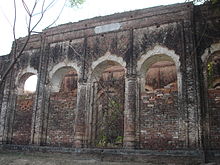- Dildar Ali Naseerabadi
-
Ayatollah Syed Dildar Ali Naseerabadi (مولانا سيد دلدار على نصيرابادى) - also known as Ghufran-Ma'ab (غفران ماب) (1820-1753)was a Shia scholar of India who originated from a family of scholars from the village of Nasirabad, Raibareli, 32 km from their District Raebareli, in Uttar Pradesh, India.
The title "Ghufran Ma'ab Nasirabadi" was bestowed on him by scholars in Najaf, Iraq and means "the one who lives in heaven" due to his scholarly attributes. Among them, his most known work is "Imad-ul-Islâm", in Arabic, which is a refutation of the anti-Shia arguments used by the famous Fakhr al-Din al-Razi. He is popularly known as Ghufran Ma'ab, was the son of Seyyid Muhammad Muin bin Seyyid Abdul Hadi. It would seem that his family, like many other Seyyid families, left Nishapur (Iran) because of the Mongol invasion and settled in India. He was born in 1166 AH. He completed his early studies in India, and in 1193 AH travelled to Iraq for further studies. Among his tutors in Iraq were great Fuqaha like Shaikh Ja'far Kashiful Ghita, and Wahid Behbehani. Later, he went to Mashhad (Iran) for further studies. Seyyid Dildar AliNasirabadi , while in India, was of Akhbari persuasion, but he changed to Usuli school after his intensive studies in Iraq. Upon his return to Lucknow, he became a Marja' in India, his fatwas being regarded as final by the Shia populace. His magnum opus in Theology (IlmulKalam) is known as "ImadulIslam" which he wrote in Arabic, in refutation of antishia arguments by FakhrudDin Razi. His detailed work in FIQH is 'MUNTAHAL AFKAR'. His sons were also pious, dedicated scholars and teachers. Seyyid Dildar Ali Nasirabadi died in the night of 19th Rajab 1235 (2 May 1820), and was buried in Lucknow.
There is an Imambargah (A holy building) in his name (Imambara Ghufran Ma'ab) in the city of Lucknow and village-Nasirabad,uttar pradesh, India.
Sources record that initially Syed Dildar Ali Naqvi was of Akhbari tendency but when he travelled to Najaf, he met scholars of high repute and became an "Usooli". He then travelled back after spending a very long time in Najaf and preached the same in India. He started writing books refuting Akhbarism which led to a extremely heated debate between Akhbaris and Usoolis. He dismounted Akhbarism from its roots and Usoolism took all of the Indian Sub-continent.
Descendants of Ghufran Ma'ab Nasirabadi
- Alam-ul-Ulama Ayatullah Al Uzma (Allama Syed Sibt-e-Hussain Naqvi)
- Syed-ul-Ulama Ayatullah Syed Ali Naqi Naqvi
- Allama Syed Naseer Ijtehadi
- Mujtahid Maulana Syed Aqa Hasan,
- Maulana Syed Kalbe Hussain,
- Maulana Syed Kalbe Abid
Categories:- Indian ayatollahs
- Shi'a clerics
- People from Lucknow
- Indian Shi'a Muslims
Wikimedia Foundation. 2010.

